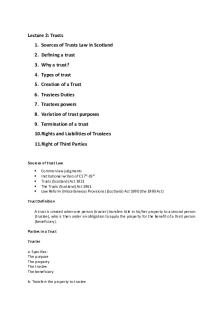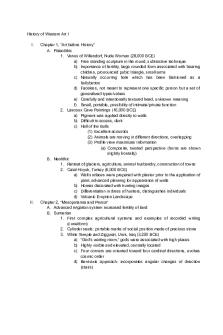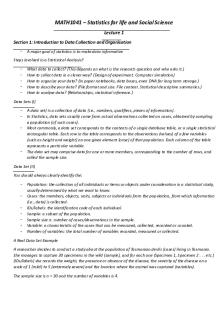Fromality s53(1) notes PDF

| Title | Fromality s53(1) notes |
|---|---|
| Course | Equity and Trusts |
| Institution | Royal Melbourne Institute of Technology |
| Pages | 3 |
| File Size | 215.1 KB |
| File Type | |
| Total Downloads | 103 |
| Total Views | 123 |
Summary
Fromality s53(1) notes of equity and trust...
Description
DISPOSTIONS OF EQUITABLE INTERESTS & THE REQUIREMENT OF WRITING -
-
-
S 23C(1)(c) Conveyancing Act is concerned with ‘dispositions’ of equitable interest in property Æ the purpose of ‘singling out subsisting equitable interest for protection is because evidence of their movement will often be the only indicator of where a particular right resides at any given time. There is no documentary paper title, nor generally is there physical possession’. x Pascoe v Boensch (2008) purposes are: 1. To prevent hidden oral transactions in equitable interest 2. To enable a trustee to ascertain who are the beneficiaries of a trust A ‘disposition’ includes, but goes beyond, an assignment. x PT Ltd v Maradona Pty Ltd (No 2) (1992), Giles J concluded that a disposition ‘points to a wide concept, extending to any form of assurance, disclaimer or release of property’. A disposition of property can be broadly defined as including any acts taken by an owner of property that result in that owner ceasing to be the owner of the properly Critical aspect: ‘is the intention and the result, not the mechanism by which the intention is fulfilled’. x Includes a declaration of trust: Comptroller of Stamps (Vic) v Howard-Smith Timpsons Eecutors Yerbur [1936] Romer LJ said that equitable interests in property can be disposed of by four different methods 1. Assignments 2. Directions by beneficiaries to trustees 3. Agreements to assign 4. Declarations of trust
Provisions of s23C of the Conveyancig Act 1919 (NSW) 23C Instruments required to be in writing (1) Subject to the provisions of this Act with respect to the creation of interests in land by parol: (a) no interest in land can be created or disposed of except by writing signed by the person creating or conveying he ame, o b he peon agent thereunto lawfully authorised in writing, or by will, or by operation of law, (b) a declaration of trust respecting any land or any interest therein must be manifested and proved b ome iing igned b ome peon ho i able o declae ch o b he peon will, (c) a disposition of an equitable interest or trust subsisting at the time of the disposition, must be in iing igned b he peon dipoing of he ame o b he peon will, or by the peon agent thereunto lawfully authorised in writing. (2) This section does not affect the creation or operation of resulting, implied, or constructive trusts.
23
NB: x
x
x x x
The writing requirement can be satisfied by more than one document provided they are obviously interconnected Australian and New Zealand Banking Group Ltd v Widin (1990) S 23C(1)(b) does not require the trust of land to be created in writing merely requires evidence in writing in relation to a declaration of trust of land Byrnes v Kendle (2011). o However, the disposition or creation of an interest pursuant to s 23C(1)(a) must itself be in writing Disposition of a subsisting interest must also be in writing Ss 23C(1)(a) and (b) apply to the creation or disposition of interests, whereas s 23C(1)(c) applies to the disposition of subsisting interest S 23C(1)(a) applies to the disposition of legal and equitable interest in land Adamson v Hayes (1973) S 23C(1)(a) and s 23C(1)(b) apply only to land, whereas s 23C(1)(c) applies to interest in land and personalty Pty Ltd v Maradona Pty Ltd
Dispositions by way of assignment - Assignments of equitable interest need to be in writing - s 23C(1)(c) Æ but this only applies in cases of subsisting equitable interests x If the assignor has both the legal and equitable interests in property s 23C(1)(c) does not apply Commissioner of Stamp Duties (Queensland) v Livingston [1965] ruled that where a person owns property legally and beneficially there is no distinction between the legal and equitable interests x Westdeutsche Landesbank Girozentrale v Islington London Borough Council [1996]: ‘A person solely entitled to the full beneficial ownership of money or property, both at law and in equity, does not enjoy an equitable interest in that property. The legal title carries with it all rights. Unless or until there is a separation of the legal and equitable estates, there is no separate equitable title’. Dispositions by way of a direction by a beneficiary to a trustee - A direction by a beneficiary to a trustee of property in relation to the equitable interest in that property can take various forms: 1. A direction to hold trust property for a third party 2. A direction to transfer trust property in its entirety to a third party
24
Section designed to give a purchaser protection against earlier unregistered interest between completion of the purchaser and the registration of the interest x it is not protection against notice of unregistered interests must be a BFP without notice Wilkes v Spooner allows purchaser to hide behind vendor provided he is a BFP without notice. x
-
FIDUICARY OBLIGATIONS STEPS: 1. What is the fiduciary relationship? a. Mason J test b. Presumed categories of fiduciary relationship 2. Scope of the relationship? 3. Breach? s The person in whom confidence is reposed within that relationship is referred to as the fiduciary. The person to whom fiduciary obligations are owed is called the beneficiary (or the principal) - If a fiduciary abuses his position to obtain an advantage or benefit at the expense of the beneficiary, the beneficiary will be able to seek relief from a court of equity to prevent such advantage accruing to the fiduciary - Westpac Banking Corporation v The Bell Group Ltd (In Liq) (No 3) [2012] the ‘fiduciary principle was developed to monitor and redress ‘abuse of a loyalty reposed’ in a relationship where one party occupies a position of influence, ascendancy or power in relation to the other and has undertaken to use that position for the welfare of the other’. THE NATURE OF FIDUCIARY OBLIGATIONS Strict horizontal and vertical duties - Fiduciary obligations are strict it is an obligation of ‘undivided loyalty’ Beach Petroleum NL v Kennedy (1999) - The fact that there was no intent to defraud on the part of the fiduciary is irrelevant Nocton v Lord Ashburton [1919]
38...
Similar Free PDFs
Popular Institutions
- Tinajero National High School - Annex
- Politeknik Caltex Riau
- Yokohama City University
- SGT University
- University of Al-Qadisiyah
- Divine Word College of Vigan
- Techniek College Rotterdam
- Universidade de Santiago
- Universiti Teknologi MARA Cawangan Johor Kampus Pasir Gudang
- Poltekkes Kemenkes Yogyakarta
- Baguio City National High School
- Colegio san marcos
- preparatoria uno
- Centro de Bachillerato Tecnológico Industrial y de Servicios No. 107
- Dalian Maritime University
- Quang Trung Secondary School
- Colegio Tecnológico en Informática
- Corporación Regional de Educación Superior
- Grupo CEDVA
- Dar Al Uloom University
- Centro de Estudios Preuniversitarios de la Universidad Nacional de Ingeniería
- 上智大学
- Aakash International School, Nuna Majara
- San Felipe Neri Catholic School
- Kang Chiao International School - New Taipei City
- Misamis Occidental National High School
- Institución Educativa Escuela Normal Juan Ladrilleros
- Kolehiyo ng Pantukan
- Batanes State College
- Instituto Continental
- Sekolah Menengah Kejuruan Kesehatan Kaltara (Tarakan)
- Colegio de La Inmaculada Concepcion - Cebu















